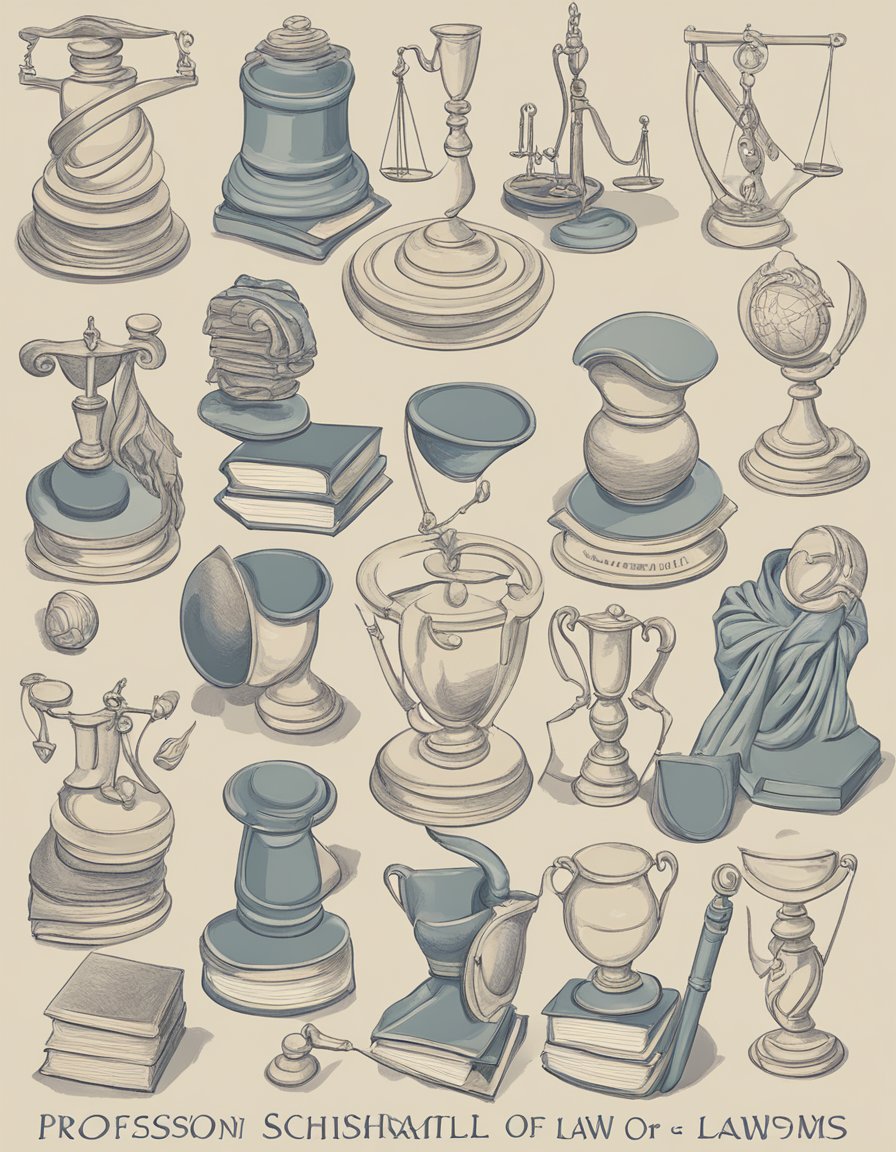What Are the Top Scholarships for Law Students? A Comprehensive Guide.
Law school can be an expensive journey, and many students rely on scholarships to help cover the costs of tuition, textbooks, and other expenses. However, with so many scholarships available, it can be overwhelming to determine which ones are the best fit for you. This article will explore the top scholarships available for law students, as well as provide guidance on how to apply for them and what factors to consider when choosing a scholarship.
Understanding Scholarships for Law Students:
Scholarships are financial awards that do not need to be repaid. They are typically awarded based on a variety of factors, including academic achievement, financial need, and diversity. Scholarships can come from a variety of sources, including law schools, private organizations, and legal associations. Some scholarships are specifically targeted towards students pursuing certain areas of law, while others are open to all law students.
Top Scholarships for Law Students:
There are many scholarships available for law students, but some of the top scholarships include the Phillip Robinson Memorial Scholarship, the American Bar Association Legal Opportunity Scholarship, and the Thurgood Marshall College Fund Scholarship. These scholarships provide financial support to students who may not otherwise be able to afford law school and help to promote diversity and inclusion within the legal profession.
Key Takeaways
- Scholarships are financial awards that do not need to be repaid and are awarded based on a variety of factors.
- Top scholarships for law students include the Phillip Robinson Memorial Scholarship, the American Bar Association Legal Opportunity Scholarship, and the Thurgood Marshall College Fund Scholarship.
- When applying for scholarships, students should consider factors such as eligibility requirements, application deadlines, and financial need.
Understanding Scholarships for Law Students
Law school is expensive, and many students rely on financial aid to help them pay for tuition and other expenses. Scholarships are a type of financial support that can help law students cover the cost of their education. Scholarships are awarded based on a variety of factors, including academic merit, financial need, and other criteria.
Law school scholarships can be offered by law schools themselves, as well as by outside organizations and foundations. Some scholarships are specifically designed for students who are pursuing certain areas of law, such as environmental law or intellectual property law. Other scholarships may be available to students who demonstrate financial need or who have a high GPA.
Scholarship opportunities for law students can be highly competitive, and it is important for students to start researching and applying for scholarships early in their law school career. Many law schools have their own scholarship programs, and students should also look for outside scholarship opportunities.
In addition to scholarships, students may also be eligible for grants and other forms of financial aid. Grants are typically awarded based on financial need, and do not need to be repaid like loans do. Students should also consider taking out student loans to help cover the cost of their education.
Overall, scholarships and other forms of financial support can be a valuable resource for law students who are looking to reduce the cost of their education. By researching scholarship opportunities and applying for financial aid, students can make law school more affordable and accessible.
Top Scholarships for Law Students
Law school can be expensive, but fortunately, there are numerous scholarships available to help alleviate the financial burden. Here are some of the top scholarships for law students:
- Sidney B. Williams, Jr. Scholarship: This scholarship is awarded annually to a law student who is a member of the American Bar Association (ABA) and has demonstrated an interest in health law. The scholarship is worth $5,000 and is open to all law students.
- Mike Eidson Scholarship: The Mike Eidson Scholarship is awarded annually to a law student who is a member of the Association of Trial Lawyers of America (ATLA) and has demonstrated a commitment to the civil justice system. The scholarship is worth $5,000 and is open to all law students.
- Earl Warren Scholarship: The Earl Warren Scholarship is awarded annually to a law student who has demonstrated a commitment to social justice and civil rights. The scholarship is worth $10,000 and is open to all law students.
- Judge John R. Brown Award: The Judge John R. Brown Award is awarded annually to a law student who has written an outstanding paper on a legal subject. The award is worth $10,000 and is open to all law students.
- ABA Legal Opportunity Scholarship Fund: The ABA Legal Opportunity Scholarship Fund provides financial assistance to incoming diverse law students. The scholarship is worth $15,000 over the course of three years and is open to all incoming law students.
- Attorney Ken Nugent Legal Scholarship: The Attorney Ken Nugent Legal Scholarship is awarded annually to a law student who is a resident of Georgia and has demonstrated academic excellence. The scholarship is worth $5,000 and is open to all law students.
- Zelle Diversity in Law Scholarship: The Zelle Diversity in Law Scholarship is awarded annually to a law student who has demonstrated a commitment to diversity and inclusion in the legal profession. The scholarship is worth $30,000 and is open to all law students.
- Rizio Liberty Lipinsky Lawyer Scholarship: The Rizio Liberty Lipinsky Lawyer Scholarship is awarded annually to a law student who has demonstrated a commitment to social justice and civil rights. The scholarship is worth $10,000 and is open to all law students.
- MCCA Lloyd M. Johnson, Jr. Scholarship: The MCCA Lloyd M. Johnson, Jr. Scholarship is awarded annually to a law student who has demonstrated a commitment to diversity and inclusion in the legal profession. The scholarship is worth $10,000 and is open to all law students.
- Arent Fox Diversity Scholarship: The Arent Fox Diversity Scholarship is awarded annually to a law student who has demonstrated a commitment to diversity and inclusion in the legal profession. The scholarship is worth $20,000 and is open to all law students.
- One Lawyer Can Change the World Scholarship: The One Lawyer Can Change the World Scholarship is awarded annually to a law student who has demonstrated a commitment to public service. The scholarship is worth $10,000 and is open to all law students.
- LGBT Public Interest Scholarship Program: The LGBT Public Interest Scholarship Program is awarded annually to law students who have demonstrated a commitment to advancing LGBT rights. The scholarship is worth $5,000 and is open to all law students.
- Sarita and Claire Wright Lucas Foundation: The Sarita and Claire Wright Lucas Foundation provides financial assistance to law students who are pursuing a career in public interest law. The scholarship is worth $5,000 and is open to all law students.
- Han C. Choi Scholarship: The Han C. Choi Scholarship is awarded annually to a law student who has demonstrated a commitment to public interest law. The scholarship is worth $5,000 and is open to all law students.
These are just a few of the many scholarships available to law students. By applying for these scholarships, students can help offset the cost of their legal education and pursue their dreams of becoming lawyers.
Scholarships Based on Diversity and Minority Status

Law students who identify as members of a minority group may be eligible for scholarships that support their academic pursuits. These scholarships are designed to promote diversity and inclusion in the legal profession and to help offset the financial burden of pursuing a law degree. Here are some of the top scholarships available for law students based on diversity and minority status:
1. American Bar Association (ABA) Legal Opportunity Scholarship Fund
The ABA Legal Opportunity Scholarship Fund is open to first-year law students who come from backgrounds that are traditionally underrepresented in the legal profession. This includes students who identify as racial or ethnic minorities, LGBTQ+, and individuals with disabilities. The scholarship provides up to $15,000 over three years to help cover the cost of tuition and other expenses.
2. Asian American Bar Association (AABA) Law Foundation Scholarship
The AABA Law Foundation Scholarship is available to law students of Asian Pacific Islander descent who demonstrate a commitment to serving the Asian Pacific Islander community. The scholarship provides up to $10,000 to help cover the cost of tuition and other expenses.
3. National Black Law Students Association (NBLSA) Scholarships
The NBLSA offers several scholarships to support the academic pursuits of African American law students. These scholarships include the Justice George Lewis Ruffin Scholarship, the Judge A. Leon Higginbotham Scholarship, and the Wiley A. Branton Scholarship. Each scholarship provides up to $5,000 to help cover the cost of tuition and other expenses.
4. Hispanic National Bar Association (HNBA) Legal Education Fund
The HNBA Legal Education Fund offers several scholarships to support the academic pursuits of Hispanic law students. These scholarships include the HNBA Legal Education Fund Scholarship, the HNBA/Microsoft Intellectual Property Law Institute Scholarship, and the HNBA/Microsoft Intellectual Property Law Institute Fellowship. Each scholarship provides up to $10,000 to help cover the cost of tuition and other expenses.
5. Women Lawyers Association of Los Angeles (WLALA) Foundation Scholarship
The WLALA Foundation Scholarship is available to law students who identify as women or women of color and who demonstrate a commitment to promoting women’s rights and gender equality. The scholarship provides up to $5,000 to help cover the cost of tuition and other expenses.
These scholarships are just a few examples of the many opportunities available to law students who identify as members of a minority group. By supporting diversity and inclusion in the legal profession, these scholarships help ensure that the legal system is representative of the communities it serves.
Financial Considerations and Support

Law school can be expensive, so it’s important for students to consider their financial options and seek out support when needed. Here are some resources and scholarships that can help alleviate the financial burden of law school.
FAFSA
The Free Application for Federal Student Aid (FAFSA) is a form that students can fill out to determine their eligibility for federal financial aid. This aid can come in the form of grants, work-study programs, and loans. It’s important for law students to fill out the FAFSA to see if they qualify for any federal financial assistance.
Scholarships
There are a variety of scholarships available to law students. Some scholarships are merit-based, while others are need-based. Here are a few examples:
- The Selected Professions Fellowship provides up to $20,000 in financial assistance to women who are pursuing graduate degrees in selected professions, including law.
- The American Association of University Women (AAUW) offers several scholarships and grants to college students, including the Career Development Grant, which provides up to $2,000 to women who are pursuing advanced degrees in fields where women are underrepresented.
- Many universities offer scholarships specifically for law students, so it’s important to check with the financial aid office at your school to see what options are available.
Student Debt
Law school can also lead to a significant amount of student debt. It’s important for students to be aware of their options for managing their debt after graduation. One option is to consider income-driven repayment plans, which adjust your monthly payments based on your income. Another option is to consider loan forgiveness programs, which forgive some or all of your student loan debt in exchange for working in certain fields or for certain employers.
Books and Supplies
In addition to tuition and fees, law students also need to purchase books and supplies for their classes. This can add up quickly, so it’s important to budget for these expenses. One way to save money on textbooks is to buy used or rent them. Some schools also offer book scholarships or vouchers to help cover the cost of books and supplies.
Low-Income Students
For students from low-income families, there are additional resources available to help with the cost of law school. The Legal Services Corporation provides funding to legal aid organizations across the country, which can provide free or low-cost legal services to low-income individuals and families. Additionally, some law schools offer scholarships or grants specifically for low-income students.
Overall, there are many financial considerations to keep in mind when pursuing a law degree. It’s important for students to be aware of their options and seek out support when needed.
Scholarships for Specific Areas of Law

In addition to general scholarships, there are also scholarships available for law students pursuing specific areas of law. These scholarships can help students offset the cost of tuition and other expenses while focusing on their chosen field.
Civil Rights
Law students interested in civil rights law may be eligible for scholarships from organizations such as the NAACP Legal Defense and Educational Fund, which offers the Earl Warren Scholarship, and the American Civil Liberties Union, which offers the Michael Joel Rosenfeld Award. These scholarships typically require applicants to demonstrate a strong commitment to civil rights and social justice through their academic and extracurricular activities.
Public Service
For law students interested in public service, there are several scholarships available. The Equal Justice Works Fellowship provides funding for law students and recent graduates who are committed to working in public interest law. The Skadden Fellowship offers two-year fellowships to law students and graduates who want to work in the public interest. The Harry S. Truman Scholarship Foundation also offers scholarships to law students who plan to pursue careers in public service.
Intellectual Property
Law students interested in intellectual property law may be eligible for scholarships from organizations such as the American Intellectual Property Law Association, which offers the Robert C. Watson Award, and the Intellectual Property Law Section of the State Bar of California, which offers the IP Vanguard Award. These scholarships typically require applicants to demonstrate a strong interest in intellectual property law and academic achievement in related coursework.
Corporate Law
For law students interested in corporate law, there are several scholarships available. The American Bar Association Section of Business Law offers the Mendes Hershman Student Writing Contest, which awards a cash prize to the winner. The Association of Corporate Counsel also offers the Diversity Scholarship Program, which provides financial assistance to law students who are members of underrepresented groups and interested in pursuing a career in corporate law.
Patent Law
Law students interested in patent law may be eligible for scholarships from organizations such as the American Intellectual Property Law Education Foundation, which offers the Sidney B. Williams Jr. Intellectual Property Law Scholarship, and the Intellectual Property Owners Education Foundation, which offers the Herbert Wamsley Scholarship. These scholarships typically require applicants to demonstrate a strong interest in patent law and academic achievement in related coursework.
Trial Lawyer/Trial Advocacy
For law students interested in trial law or trial advocacy, there are several scholarships available. The American Association for Justice offers the Richard D. Hailey Scholarship, which provides financial assistance to law students who are interested in pursuing a career in trial law. The International Academy of Trial Lawyers also offers the Student Advocacy Award, which recognizes law students who have excelled in trial advocacy.
Prosecutor
Law students interested in pursuing a career as a prosecutor may be eligible for scholarships from organizations such as the National District Attorneys Association, which offers the National Advocacy Center Scholarship, and the National Black Prosecutors Association, which offers the George N. Leighton Scholarship. These scholarships typically require applicants to demonstrate a strong interest in criminal law and academic achievement in related coursework.
Personal Injury
For law students interested in personal injury law, there are several scholarships available. The American Association for Justice offers the Leesfield/AAJ Scholarship, which provides financial assistance to law students who are interested in pursuing a career in personal injury law. The Melvin M. Belli Society also offers the Melvin M. Belli Scholarship, which recognizes law students who have demonstrated a commitment to the field of personal injury law.
Law School Accreditation and Scholarship Eligibility
Law school accreditation is an important factor in determining scholarship eligibility. The American Bar Association (ABA) is the primary accrediting body for law schools in the United States. ABA-accredited law schools are recognized as meeting certain standards of quality and are therefore more likely to offer scholarships to their students.
To be eligible for most law school scholarships, a student must be enrolled in a Juris Doctor (JD) program at an ABA-accredited law school. Some scholarships may also be available to students pursuing other legal degrees, such as a Master of Laws (LLM) or a Doctor of Juridical Science (SJD).
In addition to being enrolled in an ABA-accredited law school, scholarship applicants may also need to meet other eligibility criteria, such as:
- Demonstrating financial need
- Maintaining a certain GPA
- Belonging to a specific demographic group (e.g. women, minorities, LGBTQ+ individuals)
- Demonstrating a commitment to public service or a particular area of law
It is important to carefully review the eligibility criteria for each scholarship before applying to ensure that the applicant meets all requirements.
Overall, students enrolled in an ABA-accredited law school have the best chance of securing scholarships to help finance their legal education. However, it is important to research and apply for scholarships early and often to maximize the chances of receiving financial assistance.
Application Process for Law School Scholarships
The application process for law school scholarships varies depending on the scholarship provider. Some scholarships require applicants to submit an application form, transcripts, letters of recommendation, and a personal statement. Other scholarships may require additional materials such as a resume, writing samples, or proof of financial need.
Many scholarship providers also require applicants to meet certain eligibility criteria such as being a U.S. citizen or permanent resident, having a minimum GPA, or being enrolled in an accredited law school. It is important for applicants to carefully review the eligibility requirements for each scholarship before applying.
In addition to academic achievements, some scholarships may also consider an applicant’s extracurricular activities, such as participation in internships, employment, or pro bono work. Applicants should highlight any relevant experiences in their application materials and demonstrate how these experiences have prepared them for a career in law.
To increase their chances of receiving a scholarship, applicants should also pay attention to deadlines and submit their materials well in advance. It is also recommended that applicants apply for multiple scholarships to increase their chances of receiving funding.
Overall, the application process for law school scholarships can be competitive, but with careful preparation and attention to detail, applicants can increase their chances of receiving funding to help offset the cost of their legal education.
Scholarships from Legal Associations and Organizations

Legal associations and organizations offer a variety of scholarships to law students. These scholarships can help students cover the cost of tuition, books, and other expenses associated with attending law school. Here are some of the top scholarships available from legal associations and organizations:
- American Association for Justice (AAJ) Law Student Scholarships: The AAJ offers several scholarships to law students, including the Richard D. Hailey Scholarship, the Mike Eidson Scholarship, and the Leesfield/AAJ Scholarship. These scholarships are awarded based on financial need, academic achievement, and a demonstrated commitment to the civil justice system.
- Rizio Liberty Lipinsky Lawyer Scholarship: This scholarship is awarded annually to a law student who has demonstrated a commitment to helping individuals who have been injured by the negligence of others. The scholarship is open to all law students who are currently enrolled in an accredited law school in the United States.
- ABA Legal Opportunity Scholarship Fund: The American Bar Association (ABA) offers this scholarship to racially and ethnically diverse students who are entering law school for the fall semester. The scholarship provides $15,000 of financial assistance over the course of three years in law school.
- ABA Legal Opportunity Scholarship Fund for First-Year Law Students: This scholarship is available to first-year law students who are members of racial and ethnic groups that are traditionally underrepresented in the legal profession. The scholarship provides $15,000 of financial assistance over the course of three years in law school.
- ABA Legal Opportunity Scholarship Fund for Second-Year Law Students: This scholarship is available to second-year law students who are members of racial and ethnic groups that are traditionally underrepresented in the legal profession. The scholarship provides $15,000 of financial assistance over the course of two years in law school.
These scholarships are just a few examples of the opportunities available to law students from legal associations and organizations. Students who are interested in pursuing a career in law should research the various scholarships available to them and apply for as many as possible.
Scholarships for Future Public Interest Lawyers

Law students who are interested in pursuing a career in public interest law can apply for various scholarships. These scholarships are designed to provide financial assistance to students who demonstrate a strong commitment to public service and social justice.
One such scholarship is the Public Interest Scholars Program offered by Berkeley Law. This three-year scholarship covers full tuition and fees for J.D. students dedicated to public interest work. The program is part of Berkeley Law’s public mission and commitment to public interest students. The first class of Public Interest Scholars was admitted in 2021.
Law students who are interested in pro bono work can apply for the Pro Bono Publico Award offered by the American Bar Association. This award is given to law students who have demonstrated a commitment to pro bono work during their time in law school. The award recognizes the important role that pro bono work plays in promoting access to justice for all.
Overall, there are many scholarships available for law students who are interested in pursuing a career in public interest law. These scholarships provide financial assistance to students who demonstrate a strong commitment to public service and social justice.
Conclusion
In conclusion, there are many scholarships available to law students that can help offset the high cost of tuition. These scholarships are offered by a variety of organizations, including law firms, bar associations, and private foundations. Some of the most popular scholarships include the ABA Legal Opportunity Scholarship Fund, the Future Attorneys of America Scholarship, and the Emery Reddy Legal Studies Scholarship.
It is important for law students to research and apply for as many scholarships as possible to increase their chances of receiving financial aid. Students should also consider meeting with a financial aid advisor to discuss their options and create a plan for paying for law school.
Overall, scholarships can be a great way for law students to reduce the burden of student debt and achieve their career goals without worrying about financial constraints. With careful planning and research, students can find the right scholarships to help fund their legal education.






